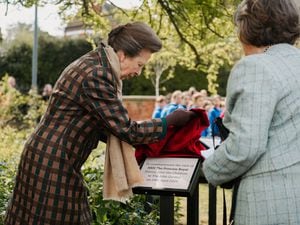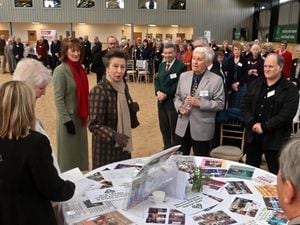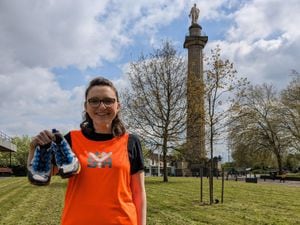Pledge to continue welcoming refugees to Shropshire
Refugees from war-torn Syria will continue to be welcomed into Shropshire, council leaders pledged today.
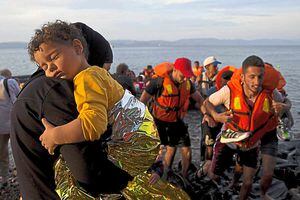
More than six million Syrians have now fled their homes in hope of a safer life and although Shropshire is thousands of miles away, the county is offering sanctuary for some of those looking for refuge.
So far Shropshire Council has provided a home for 54 refugees, neighbouring local authority Telford & Wrekin has welcomed 10 people, and Powys will be home to 12 households of refugees by the end of next month.
It is a situation replicated across the country with some of the Midlands' councils stepping up to offer their support.
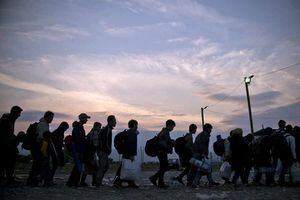
Shropshire Council: Has taken in 54 refugees so far and is expecting to take in another two families later in the year
Telford & Wrekin Council: Has welcomed 10 refugees and will take another 10 each year for five years
Powys County Council: Will be home to 12 households of refugees by the end of March
Staffordshire County Council: Has taken in 51 refugees so far
Walsall Council: Will welcome 20 refugees by May
Wolverhampton Council: Is expecting to take in 100 refugees by 2020
Dudley Council: Had two families move in last year, with 20 more refugees being brought in over five years
Sandwell Council: Has not taken any refugees
Wolverhampton Council has pledged to take 100 Syrians by 2020, while Dudley will take in 20 over the next five years and Walsall will accept 20 by May.
Staffordshire County Council has already taken in 51 people from the Middle Eastern country.
One of the key issues facing the councils has been ensuring that the refugees feel welcome and comfortable in what is a very different environment.
Laura Fisher, Shropshire Council's housing services manager, said: "Shropshire Council has committed to the resettling of 15 Syrian families throughout the Shropshire area. To date we have received 13 families, with two more due later in the year.
"The families are housed in a number of different communitieswith consideration to school and GP places as well as support networks featuring heavily in any decision made.
"All of the families have settled well in their local communities and are integrating with their neighbours and fellow residents. All the children are in school or nursery places and the adults are taking part in ESOL (English Speaking for Other Languages) classes."
Mrs Fisher said that the council had been hugely heartened by the support from local people and volunteers in helping the refugees settle.
He said: "The local support has been overwhelming and we thank all volunteers who have helped these families quickly settle into their local communities.
"Refugee Action is continuing to work intensively with the families, with emphasis being placed on seeking employment and voluntary work."
Shropshire Council has also confirmed that it will take in as many as 15 families by the end of the government resettlement scheme in 2020.
Telford & Wrekin says that it will be hosting 50 refugees by the end of the scheme.
Russell Griffin, a spokesman for the authority, said: "Telford & Wrekin Council is committed to hosting 10 new refugees per year over a period of five years and all of these will be fully funded by central government. The first 10 refugees, which were two families of five, successfully resettled and integrated into the Telford community last year. We look forward to welcoming a further 10 later this year."
Mal Price, Shropshire Council's cabinet member for planning, housing, regulatory services and environment, has previously said he was delighted that the authority had been able to help more people in need, and that the welcome they had received had been "overwhelming".
Speaking when Shropshire took in its most recent refugees in December he said: "We're really pleased to welcome our newest families to Shropshire.
"Our working group along with Refugee Action has worked incredibly hard over the past several months to ensure everything is in place to help and support the families to quickly settle into Shropshire life.
"There have been a great deal of logistical details to sort out prior to the refugees' arrival here, and we are only taking those we know we can safely and readily accommodate. The support from local people has been overwhelming.
"I would like to thank all those who continue to support these families, all of whom have had to flee from their homes and families because of this terrible conflict in their homeland."
Prime Minister Theresa May declared that the UK would resettle up to 20,000 refugees from the Middle East and North Africa during the current Parliament until 2020.
Refugees are assessed on their vulnerability before coming to the UK, and are resettled under the Syrian Resettlement Programme.
Those eligible for resettlement include: children, adolescents and woman at risk; survivors of violence and torture; and people at risk due to their sexual orientation and gender identity.
Across the country there are 12 local government-led organisations that help to place refugees into the hands of councils from central government.
These groups speak to councils about how many refugees each local authority would be willing to take on.
Among the countries which are included in the government's scheme are those bordering Syria. These are Jordan, Lebanon, Turkey, Egypt and Iraq, where there are large numbers of refugees.
Refugees are also assessed on their legal and physical protection needs; medical needs and disabilities.

